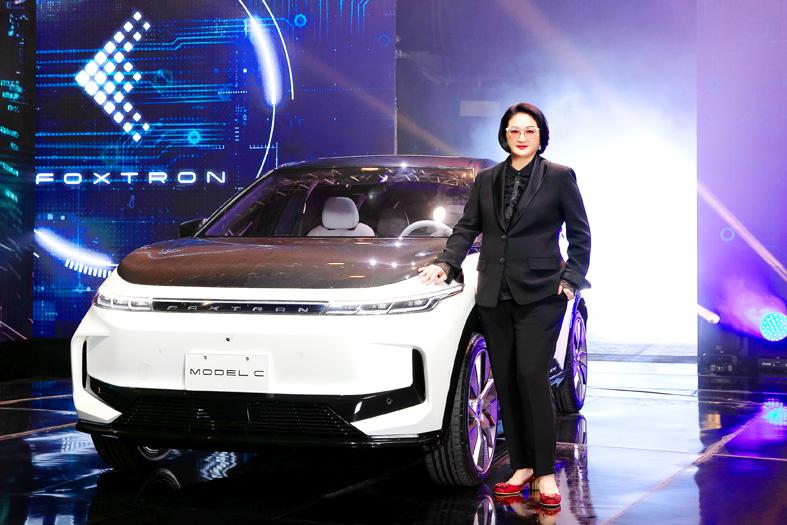Yulon Motor Co (裕隆) yesterday said that it plans to introduce a new own-brand electric vehicle in 2023, designed by Foxtron Vehicle Technologies Co (鴻華先進) on the MIH Open Platform backed by iPhone assembler Hon Hai Precision Industry Co (鴻海精密).
Yulon Motor would become Foxtron’s first customer.
Foxtron, a venture of Yulon Motors and Hon Hai, was set up with initial capital of NT$15.58 billion (US$560.63 million at the current exchange rate) in November last year.

Photo courtesy of Hon Hai Precision Industry Co
Yulon Motor’s own-brand Luxgen Motor Co (納智捷汽車) might build its new electric vehicles using Foxtron’s electric vehicle prototypes, including the Model C sports utility vehicle and the Model E sedan, Yulon Motors vice president Lee Chien-hui (李建輝) told an online investors’ conference.
“In Taiwan, Luxgen will be the first to introduce electric vehicles designed by Foxtron. The project will kick off next year in preparation for the launch in 2023. All vehicles will be made in Taiwan,” Lee said. “The Model C will be the first one introduced to the domestic market.”
Yulon Motors has made inroads into electric charging through its subsidiary YES-Energy Service Co (裕電能源), which has this year installed 2,200 charging piles at parking lots and shopping malls, Lee said.
Yulon Motors reported that its net profit more than doubled to NT$3.41 billion in the first three quarters of this year, up from NT$1.56 billion a year earlier, thanks to the implementation of a major restructuring plan at Luxgen last year.
Earnings per share soared to NT$3.49 in the three-quarter period, up from NT$1.54 a year earlier, company data showed.
However, non-operating profit plunged 46 percent to NT$1.62 billion from NT$2.98 billion a year earlier, as the auto chip shortage hit sales of Luxgen and Yulon Nissan Motor Co (裕隆日產) vehicles in Taiwan and China.
This also led to a 1 percent decline in revenue in the first three quarters to NT$57.76 billion, down from NT$58.55 billion a year earlier.
Yulon Nissan distributes Nissan and Infiniti vehicles in Taiwan, and sells cars in China via Dongfeng Nissan Ltd (東風日產), its joint venture with China’s Dongfeng Automobile Co (東風汽車).
Yulon Motors said that the opening for its property development project in New Taipei City’s Sindian District (新店) has been postponed from the end of next year to the first quarter of 2023, due mainly to the COVID-19 pandemic.
Separately, Yulon Nissan said that it is in talks with Nissan Motor Co to raise vehicle prices, after local rival Hotai Motor Co (和泰汽車), which distributes Toyota and Lexus vehicles in Taiwan, early this month hiked prices for five major imported vehicles by as much as 3.4 percent.
“All automakers are facing stiff pressure amid surges in raw material and transportation costs,” Yulon Nissan vice president Chung Wen-chuan (鐘文川) said.
The company saw net profit last quarter dip 43 percent annually to NT$2.23 billion, from NT$3.82 billion a year earlier.
It expects local sales to fall about 1.6 percent to 437,000 units this year from 444,000 units last year.

In Italy’s storied gold-making hubs, jewelers are reworking their designs to trim gold content as they race to blunt the effect of record prices and appeal to shoppers watching their budgets. Gold prices hit a record high on Thursday, surging near US$5,600 an ounce, more than double a year ago as geopolitical concerns and jitters over trade pushed investors toward the safe-haven asset. The rally is putting undue pressure on small artisans as they face mounting demands from customers, including international brands, to produce cheaper items, from signature pieces to wedding rings, according to interviews with four independent jewelers in Italy’s main

Macronix International Co (旺宏), the world’s biggest NOR flash memory supplier, yesterday said it would spend NT$22 billion (US$699.1 million) on capacity expansion this year to increase its production of mid-to-low-density memory chips as the world’s major memorychip suppliers are phasing out the market. The company said its planned capital expenditures are about 11 times higher than the NT$1.8 billion it spent on new facilities and equipment last year. A majority of this year’s outlay would be allocated to step up capacity of multi-level cell (MLC) NAND flash memory chips, which are used in embedded multimedia cards (eMMC), a managed

Japanese Prime Minister Sanae Takaichi has talked up the benefits of a weaker yen in a campaign speech, adopting a tone at odds with her finance ministry, which has refused to rule out any options to counter excessive foreign exchange volatility. Takaichi later softened her stance, saying she did not have a preference for the yen’s direction. “People say the weak yen is bad right now, but for export industries, it’s a major opportunity,” Takaichi said on Saturday at a rally for Liberal Democratic Party candidate Daishiro Yamagiwa in Kanagawa Prefecture ahead of a snap election on Sunday. “Whether it’s selling food or

In the wake of strong global demand for AI applications, Taiwan’s export-oriented economy accelerated with the composite index of economic indicators flashing the first “red” light in December for one year, indicating the economy is in booming mode, the National Development Council (NDC) said yesterday. Moreover, the index of leading indicators, which gauges the potential state of the economy over the next six months, also moved higher in December amid growing optimism over the outlook, the NDC said. In December, the index of economic indicators rose one point from a month earlier to 38, at the lower end of the “red” light.